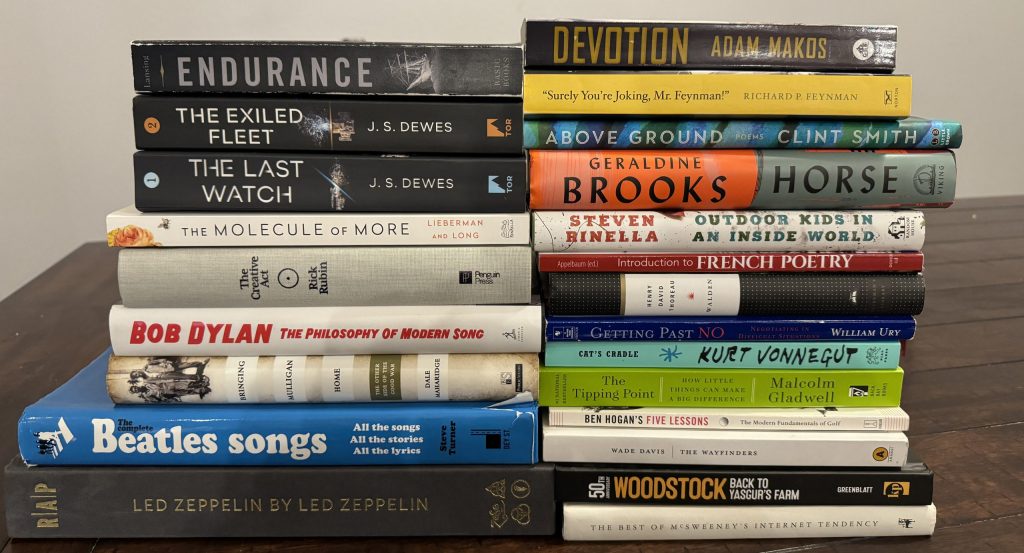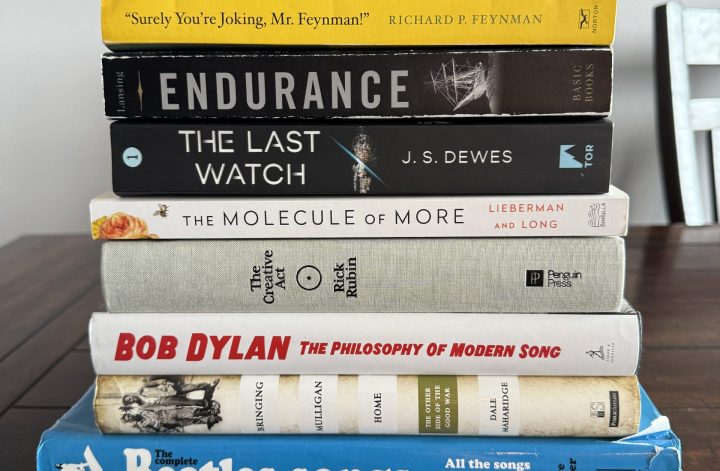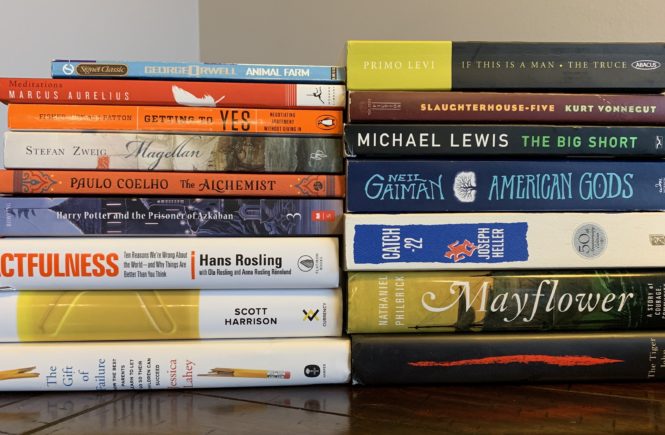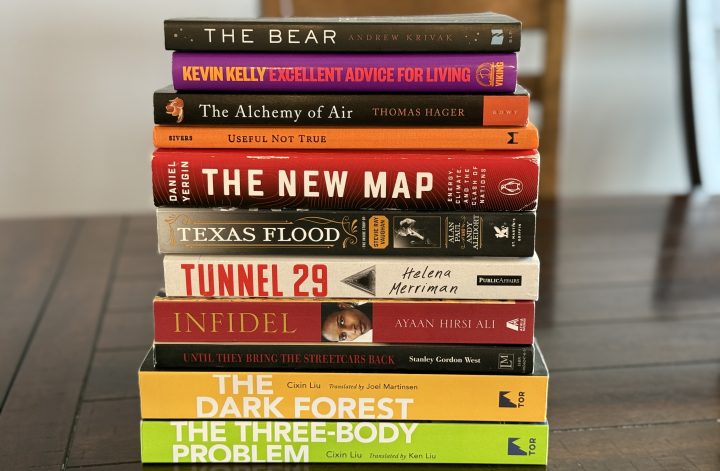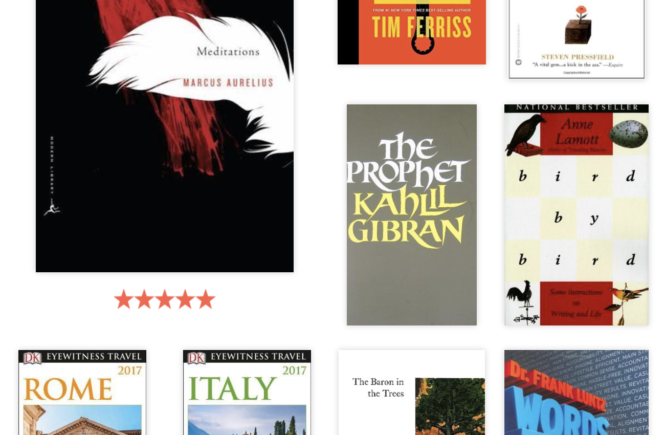This year I read a lot of books on music and creativity. I also quit feeling the need to finish every book I start. I finished 34, although 10 of those were audio books. Here were my favorites:
Project Hail Mary by Andy Weir — This is the best book I’ve read in a long time. It’s Weir’s The Martian on steroids, with the main character once again in a situation that requires him to “science the shit out of it.” The way he has to apply math, physics, biology, chemistry, etc. to his situations made it really fun. Apparently Ryan Gosling will star in the movie, to begin filming in 2024. I can’t wait. In looking for something similar, I also enjoyed the first two books in J.S. Dewes’s Divide series, and I’m looking forward to the third book coming out late this year.
Favorite line: Do you believe in God? I know it’s a personal question. I do. And I think He was pretty awesome to make relativity a thing, don’t you? The faster you go, the less time you experience. It’s like He’s inviting us to explore the universe, you know?
The Creative Act: A Way of Being by Rick Rubin — I picked this up on the day it was released. Rick Rubin produced one of my favorite albums of all time (Tom Petty’s Wildflowers) and got me into the Avett Brothers. It’s a zen-like collection of digestible bits of advice that Rick uses in the studio with his musicians—attempting to bring out the creativity in their pursuits.
Favorite line: Sharing art is the price of making it. Exposing your vulnerability is the fee.
The Molecule of More by Daniel Lieberman and Michael Long — This was one of the few traditional non-fiction books I enjoyed this year. It explains how dopamine shapes our actions. Two types of dopamine drive us to get more and to plan to get more. While this can be good, it also distracts us from the “H&N (here and now)” chemicals, like serotonin and endorphins that help us to enjoy what we already have.
Favorite line: The only point of smoking cigarettes is to get addicted so one can experience the pleasure of relieving the unpleasant feeling of craving, like a man who carries around a rock all day because it feels so good when he puts it down.
Also good: Fixing things is a unique pleasure. Each project is a problem that needs to be solved—a dopaminergic activity—and then the solution is made real. Sometimes solving repair problems requires creativity because the necessary tools or supplies aren’t available.
The Philosophy of Modern Song by Bob Dylan — Each chapter of this book is a song that Dylan comments on. It’s a unique format. Several of the songs he begins by describing the lyrics in his own colorful, artistic words—his version of the story, essentially. Others include his commentary on the writer, singer, or just the times. Surprisingly to me, most of the songs are pre-Bob Dylan; they are from the 50s or earlier. Many are old country or crooner songs. He has a lot to say about Frank Sinatra and the like. I hadn’t heard a majority of the songs, so I tried to listen to the song before or while reading each chapter.
Favorite line: The only reason any of it means anything is because it ends.
Cat’s Cradle by Kurt Vonnegut — I promised myself a few years ago to read more Kurt Vonnegut. This one didn’t disappoint. It was hilarious and full of dry humor, thoughts on government and religion, and an underlying caution about weapons of mass destruction.
Favorite line: As Bokonon says: “Peculiar travel suggestions are dancing lessons from God.”
Bringing Mulligan Home by Dale Maharidge — This book details the author’s attempt to understand what his father experienced fighting in the Pacific Theater during WWII. I read it while doing research on my Great Uncle Marion Rounds, Jr., who died fighting on the island of Okinawa days before the war ended. Through the author’s interviews, Marion’s name is mentioned twice. It provided new details on how his last few days would have gone and almost the exact location that he died. The author was gracious enough to respond to my emails and provide some of his interview notes and maps. I hope to visit Okinawa someday.
Favorite line: …another good guy by the name of Marion Rounds, and he died that day too.
Devotion by Adam Makos — This tells the true story of the first black naval aviator, how he crashes during the Korean War, and how his wingman attempts to rescue him. While it’s a good story—it’s an even better non-fictional education on the Korean War, during which my own grandfather was deployed. I also learned a lot about airplanes and air carriers. I haven’t seen the movie yet.
Greenlights by Matthew McConaughey — This is McConaughey’s memoir. The guy is a storyteller, and listening to him tell his own stories on audible was a blast. I also listened to Dave Grohl’s Storyteller and found it almost as good.
What’s Our Problem?: A Self-Help Book for Societies by Tim Urban — Tim writes the best long-form articles at waitbutwhy.com and he took several years away from his blog to write this behemoth. It reads best as a blog, so I ended up buying the iBooks version and read it on my iPad. His thesis is that politics should be thought about less as a left vs right (progressive vs conservatism), but more importantly through a high-rung vs low-rung thinking, where high-rung thinkers support a liberal (not the misused term for progressive) view of open discussion and debate—supporting or not supporting ideas based on their merit and ability to withstand rigorous debate. Low-rung thinkers prefer an “echo chamber” and shout down any dissent or debate. He spent a few pages pointing out the low-rung thinking going on with Trump supporters and then about half of the book pointing out the same in the “woke” cancel culture going on, especially around what he calls Social Justice Fundamentalism.
Favorite line: High-rung political thinkers stay inside the circle on the right, criticizing their own teammates or even standing up for the other team when doing so aligns with their principles. But low-rung political culture encourages people to stay inside the left circle, keeping true to their team, even when doing so flies in the face of their principles.
Endurance: Shackleton’s Incredible Voyage by Alfred Lansing — Shackleton’s failed attempt to traverse Antarctica on foot in 1915 turns into a true story of survival when the 27-man crew gets trapped in sea ice. After 10 months of waiting to get free, the ship sinks and they live on the ice while it slowly rotates towards the open sea. Eventually, they escape in three small lifeboats and everyone survives the two-year ordeal.
Favorite line: Shackleton said there once was a mouse who lived in a tavern. One night the mouse found a leaky barrel of beer, and he drank all he could hold. When the mouse had finished, he sat up, twirled his whiskers, and looked around arrogantly. “Now then,” he said, “where’s that damned cat?”
The Complete Beatles Songs: The Stories Behind Every Track Written by the Fab Four by Steve Turner — This is a giant coffee table book that has at least one page on every Beatles song ever written. As it goes in chronological order, it’s also a great Beatles biography. I also “read” another great coffee table book, Led Zeppelin by Led Zeppelin, although it was mostly just pictures.
Surely You’re Joking Mr. Feynman: Adventures of a Curious Character by Richard Feynman — Feynman was a physicist that worked on the atomic bomb and then lectured at several colleges, and this is his memoir. The book was entertaining. He is a mischievous character—picking file cabinet locks when developing the atomic bomb, playing percussion in South America, etc. Feynman’s approach to science was intuitive and fun, always looking for how to apply what he learned, and I hope that’s something I can take away going forward.
Favorite line: You have no responsibility to live up to what other people think you ought to accomplish. I have no responsibility to be like they expect me to be. It’s their mistake, not my failing.
